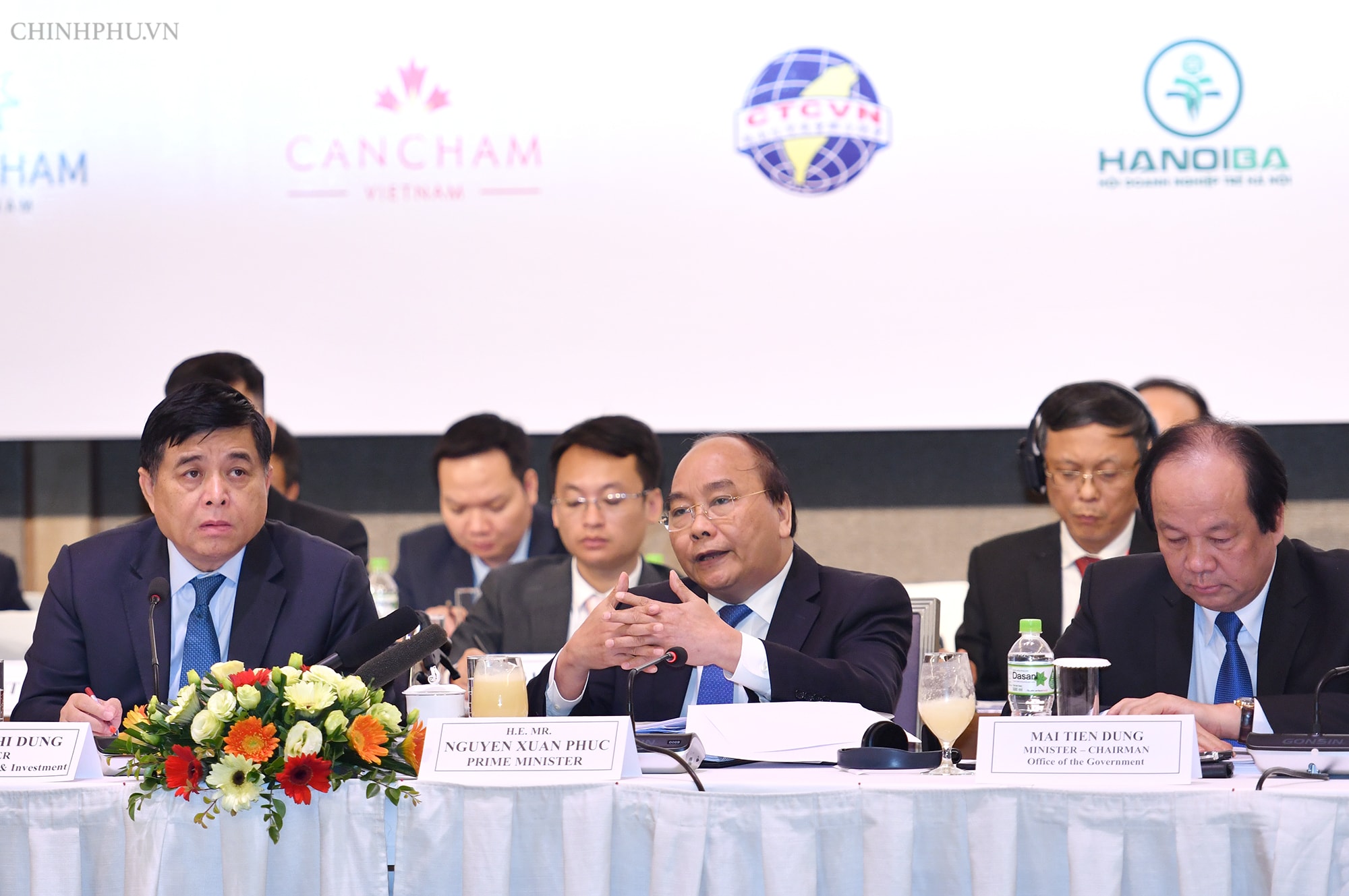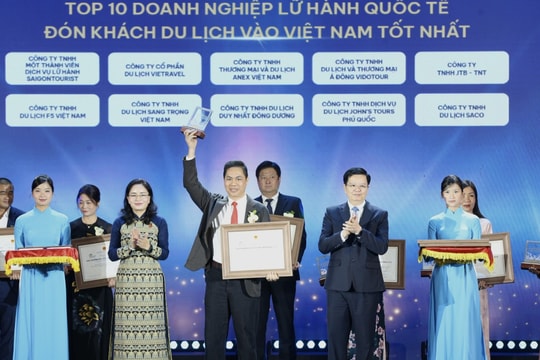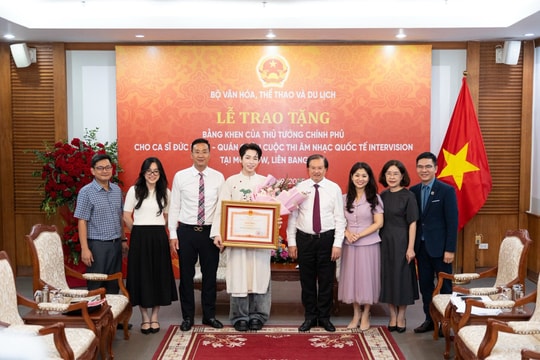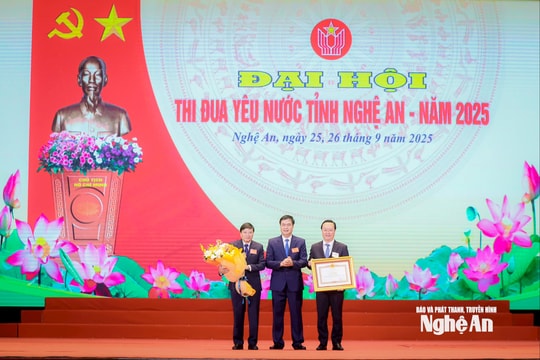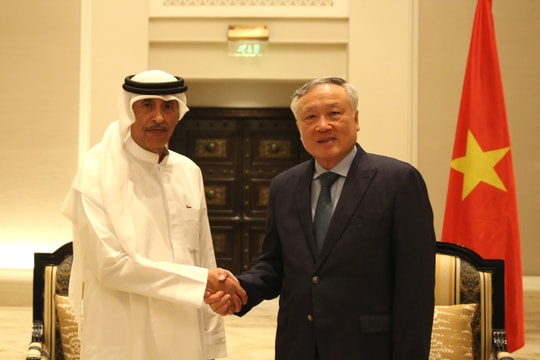Prime Minister: Business issues must be put on the first page of leaders' operating handbooks
Speaking at the Vietnam Business Forum (VBF) at the end of 2018, Prime Minister Nguyen Xuan Phuc asked ministries, branches and localities to prioritize the concerns of enterprises in their agendas and put the issues of enterprises on the first page of the leadership's operating handbook.
|
| Prime Minister Nguyen Xuan Phuc speaks at the Forum. Photo: VGP/Quang Hieu |
“Your entrepreneurial spirit and enthusiasm are the spiritual medicine that encourages the Government to act more strongly, more innovatively and more quickly,” said the Prime Minister, adding that he had listened to and recorded all constructive and critical opinions. Covering all of them are the enthusiasm, concerns and great aspirations to contribute to the strong development of Vietnam.
The Prime Minister assigned the Minister of Planning and Investment to synthesize all opinions at the Forum and report to the Prime Minister to direct relevant ministries and branches to absorb and amend institutions or take note of operational issues.
Take advantage of the "trade currents"
Considering that world trade is facing many major challenges, including the rise of protectionism, trade tensions, and the risk of eroding confidence in the free trade system, the Prime Minister affirmed that with the optimism of those who support globalization and promote the benefits of free trade, we can always find open opportunities for cooperation with the main stream still being peace, cooperation, and globalization.
Thanks to that belief, Vietnam's economy continued to achieve impressive growth in 2018, estimated at about 7%, much higher than other countries in the region, the highest growth rate in the past 10 years.
The Prime Minister stated that Vietnam is now a “big factory” of the world and a fulcrum for many large transnational corporations providing competitive products and services in the region and globally. The presence of many leading corporations in the world in Vietnam such as Samsung, Intel, Canon, Fujitsu, Toyota, Honda, Nike, Vinacapital and thousands of other FDI enterprises is a guarantee for the quality of the investment environment and growth prospects of Vietnam.
|
| Photo: VGP/Quang Hieu |
In addition, the growth of many private economic groups in Vietnam also shows that Vietnam's business environment is fully capable of nurturing large, prestigious and competitive enterprises, which are worthy partners of international corporations. Many Vietnamese enterprises are no longer playing at home but have "sailed the ocean", affirming the position and international competitiveness of Vietnamese enterprises.
More and more Vietnamese products are appearing on the world export map. Vietnam currently has more than 20 export items worth over 1 billion USD with huge potential for growth in supply chain value. Many agricultural products hold top positions in the world such as rice, pepper, coffee, basa fish... Many fruit supply chains such as dragon fruit, mango, longan, lychee, rambutan, grapefruit... practice clean and smart agricultural processes and are exported to many countries and regions with strict import standards such as the United States, Europe, Japan, Korea, Australia... The potential "agricultural gold mine" that has not been fully exploited will be a huge potential to attract investment and cooperation that Vietnam is looking forward to.
Regarding the theme of this Forum, “the shift of global trade”, the Prime Minister said that we need to see this as the natural movement of ocean currents. “There are cold ocean currents and also hot ocean currents, but we can absolutely take advantage of these “trade currents” to push our ship faster to its destination”.
This has been proven by the reality of Vietnam's three decades of innovation. 16 FTAs that have been signed or are being negotiated show the consistency in Vietnam's economic liberalization and integration policy. These agreements are opening the doors to more than 60 economies, including 15/20 G20 countries, creating opportunities to connect and participate more deeply in the global value chain and production network. It can be said that now, when standing in Vietnam, businesses can see most of the world's major markets. Vietnam plays the role of a most important gateway.
Requires effort and cooperation from three parties
If investment capital flows from low-productivity areas to high-productivity areas, trade flows from high-productivity areas to low-productivity areas. Taxes can temporarily distort trade flows, but the main flow is still determined by productivity differences. According to the Prime Minister, in that sense, if businesses cannot see and promote their comparative advantages, it will be very difficult to compete and succeed. In the trend of shifting global trade flows, each country and each business does not necessarily have to be absolutely strong to win, but only needs to know how to promote its relative competitive advantages, promote its own strengths, and create different values, then it can completely succeed.
Although the 4.0 industrial revolution, the digital economy or technological advances are considered the mainstream that determines the development trends of humanity in this century, cultural values and national identity will still exist, are what makes the difference, the source of spiritual strength, and the support for economic prosperity.
|
| The Prime Minister talks with delegates attending the forum. Photo: VGP/Quang Hieu |
The Prime Minister said that to seize opportunities and cooperate successfully, it is necessary to promote the efforts and cooperation of all three sides.
First of all, it is the efforts of Vietnamese enterprises themselves. All enterprises have comparative advantages. If they correctly identify and know how to promote those advantages, the enterprise has succeeded halfway. In addition, in the current context, to reach out to the big sea, enterprises themselves also need to eliminate the mentality of waiting for support from the Government, instead, they need to proactively grasp the opportunities and big trends that are opening up, must learn and innovate constantly to grow and become more successful.
The second is the cooperation and sharing of opportunities by FDI enterprises. The Vietnamese government wants international corporations and FDI enterprises to be more open in their supply policies; create more opportunities and support for Vietnamese enterprises to participate more deeply in the value chain; and place more trust in the capacity of Vietnamese enterprises.
Third is to promote the Government's role in creating development and accompanying. Accordingly, the Government is determined to maintain political and social stability and the macroeconomic foundation. A stable political, social and macro environment along with an optimal geopolitical position will be an outstanding comparative advantage of Vietnam in the context of a volatile world and a serious decline in confidence. The Government is committed to further promoting structural reforms, improving institutional quality and state governance capacity (both central and local levels), reforming state-owned enterprises, the financial system, handling bad debts, public debt management, etc. Efforts to clear bottlenecks for faster and more sustainable development.
The Government continues to accelerate the improvement of the business environment and enhance national competitiveness. In 2016, 2017 and 2018, the Government issued Resolution 19 on improving the business environment and enhancing national competitiveness. This shows the Government's continuous reforms in the context of ever-changing domestic and international developments, so as not to be left behind.
Noting that the Government recently issued Resolution 139 on the Action Program to reduce costs for businesses, the Prime Minister stated that if this Action Program is well implemented, it will help reduce costs for businesses by at least 10%.
"I request that ministries, branches and localities prioritize the concerns of businesses in their agendas, and put business issues on the first page of the leadership's management handbook," the Prime Minister stated.
The Government will give more priority to investment in science and technology, improving research and development (R&D) capacity, investing in infrastructure, especially smart infrastructure and digital infrastructure to promote and take advantage of opportunities of the 4.0 revolution.
Recalling his speech at the Vietnam Business Summit in September 2018, the Prime Minister said that Vietnam does not have the ambition to “become the best in globalization”, but emphasized that the Vietnamese people have a strong aspiration to become a powerful nation that is not inferior to any other country in the world in the coming decades. Only the success of the business community can bring prosperity to the country, realizing the aspiration for prosperity of the Vietnamese people in the coming decades.
The Prime Minister hopes that the VBF Forum will continue to be an important and effective policy dialogue channel between the Government and the business community, and the glue that binds the ideas, proposals and recommendations of businesses with the Government's policies.

